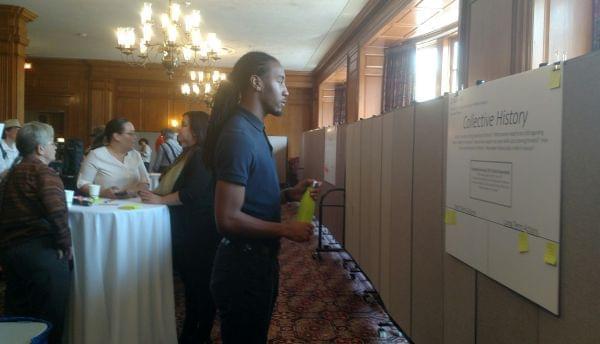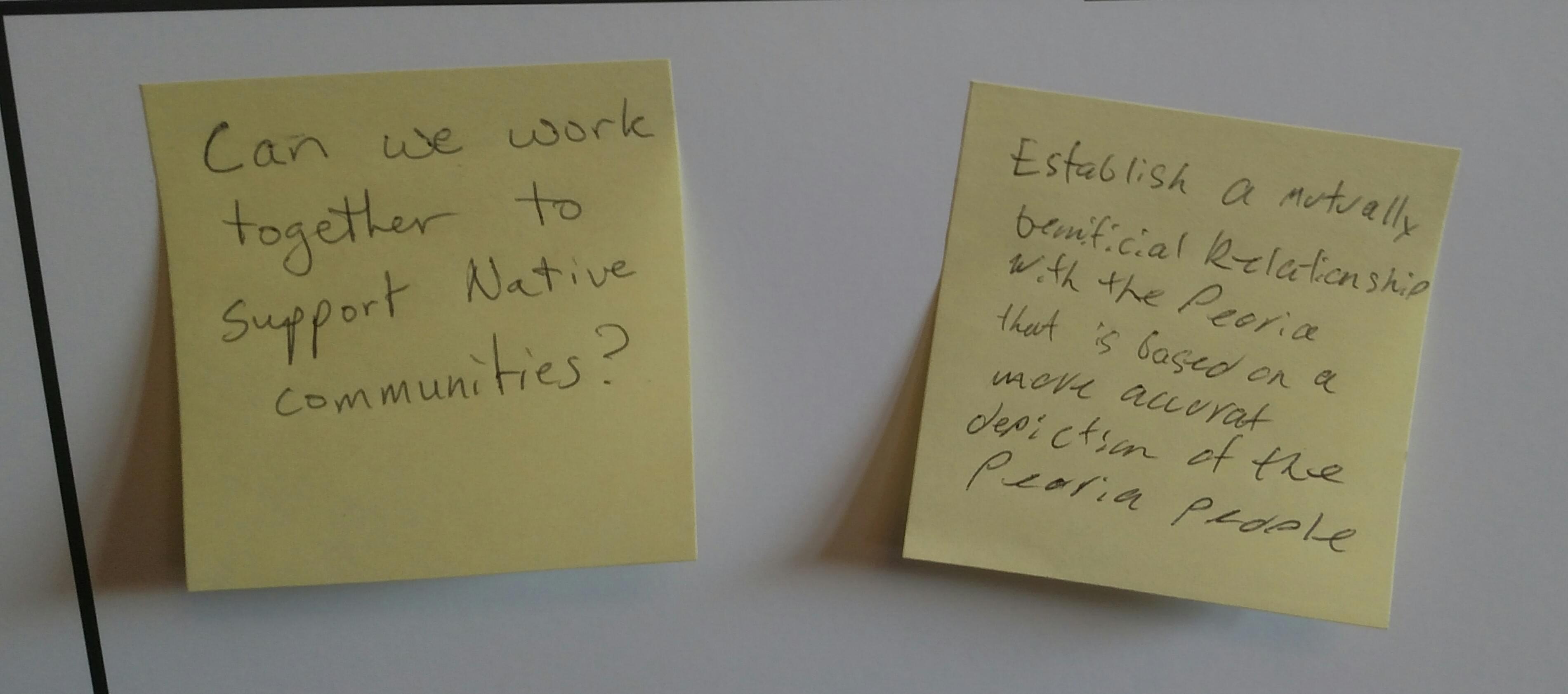Can Conversation Move The U Of I Forward Without The Chief?

Davion Peat, clerical assistant at the University of Illinois, attended a "Chancellor's Critical Conversations" event at the Illini Union on Tuesday, May 1, 2018. He said he has lots of questions about the Chief Illiniwek issue. "What's taking so long to get another mascot if we're not going to use the Chief again?" Christine Herman/Illinois Public Media
University of Illinois administrators want to see the Urbana campus move on without Chief Illiniwek. Through a series of public events, they’re seeking input from the community on how best to achieve that.
The most recent of those events took place Tuesday in the South Lounge of the Illini Union, where tall tables with post-it notes and pens were scattered throughout the middle of the room.
Large poster print-outs lined the perimeter, each with a theme written in large font at the top, and a wide-open space at the bottom where attendees place post-it notes with their answers to questions, such as: How do we respect our past while also moving forward? What education do we need as a community?
“This is an opportunity to be open,” said Rusty Barceló, visiting special assistant to the chancellor for issues related to equity and diversity. “It’s a model that I’ve used before at other institutions. It’s a good way to give people voice.”

University administrators are seeking input from the campus on community for how to move forward without Chief Illiniwek.
The plan, she said, is to collect all the ideas and put together a report for the Chancellor in the upcoming months, with both a summary of the input and recommendations for what steps the university should take to move forward without Chief Illiniwek.
“We’re excited,” Barceló said. “I’m very excited about it.”
The debate over whether the Chief is a racist mascot or an honored symbol has been happening for years, even though he was officially retired in 2007.
Rahul Raju, student senator for Illinois student government said it surprises him that this is still an issue in 2018.
“And I can say with confidence that that is true of a lot of students,” Raju said.
Raju says a new mascot, plus new traditions that students can rally around, would help provide some finality.
“The university needs to acknowledge the history of the Chief and the deep offense it caused and confront our history of appropriating native culture,” he said.
Anne McClarey is an alum who sees it differently. She was in the Marching Illini in the late ‘70s and says the intent of the Chief was always to honor.
“I feel like so many things in our society are: pick a side,” McClarey said. “And no one tries for ‘yes, and.’ Yes, help Native Americans. Yes, have work-study trips. Yes, have more scholarships, But also yes, can we honor the Chief again? It's an important part of our history, why does it have to be erased?”
Retired U of I English professor Carol Spindel authored the 2002 book “Dancing At Halftime: Sports and the Controversy Over Native American Mascots.” She said the ongoing Chief saga is hurting the university.
“People are very determined to hang onto it,” Spindel said. “It's always surprising, how much people seem to care more about the Chief than the well-being of the institution,” referring to pro-Chief alumni who she feels cause unnecessary divisions.
Margret Borchers Cuttill is the daughter of the first Chief Illiniwek: the late Webber Borchers, who started the tradition in 1929. She also feels the issue is hurting the U of I, but for an entirely different reason.
“Okay, let’s get down to the nitty gritty,” she said. “They’re losing money by being negative. A lot of the Chiefs have come visited daddy before he died, they come and see me. And they will leave nothing to the university of Illinois in their wills because the Chief is not here. They have lost millions upon [millions of] dollars.”
One thing that both sides agree on? That prior university administrators didn’t do enough to bring about a resolution to the Chief issue a decade ago.
“From what I understand, the institution wasn’t as proactive as it needed to be in terms of doing follow-through, in terms of how to heal from this,” Barceló said. But she thinks the time to move on is now.
Cuttill doesn’t think it’s possible to move forward because of people’s attachment to the Chief.
“The Chief is still a strong part of a lot of people’s lives,” she said. “Maybe not of the young people in college right now, but their fathers, mothers, grandparents.”
Raju from student government said he’s also not confident these initiatives to move the campus forward will succeed because this same dialogue has been happening for years, and yet nothing has changed.
But most of all, he wishes the Native American community was more involved in these conversations.
“Not that we should expect that emotional labor from them, or that we demand their presence every time we are talking about this,” he said. “But that, I wish we had the right voices at the table more often than we do.”
He said Native Americans are the ones who face real harm everyday from the Chief’s continued presence on campus, and it’s their well-being that should be considered above all.
Links
- Generational differences in views of Chief Illiniwek
- WILL-TV’s Talking Point panel on Chief Illiniwek
- THE HISTORY OF CHIEF ILLINIWEK
- ‘Critical Conversations’ Events Aim To Bridge Divide Over Chief Illiniwek
- Chief Illiniwek Controversy Carries On; Gubernatorial Candidate Chris Kennedy
- Chief Illiniwek Controversy Surrounds Homecoming Parade

